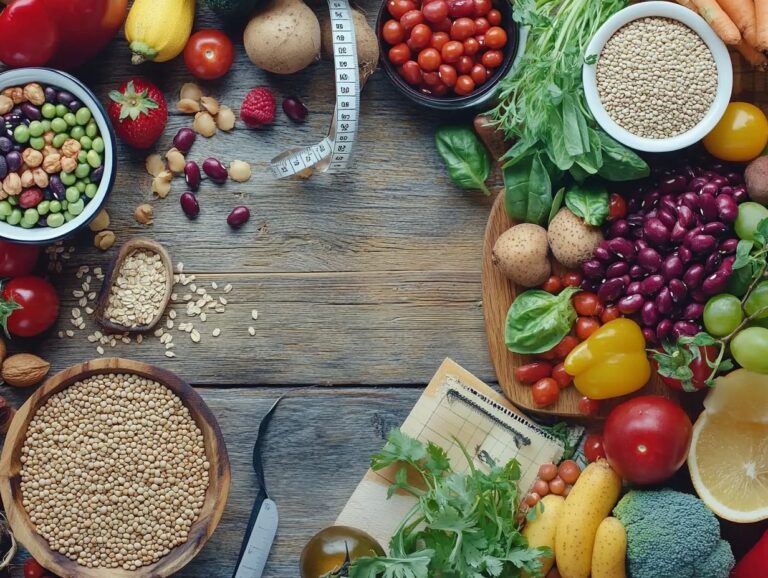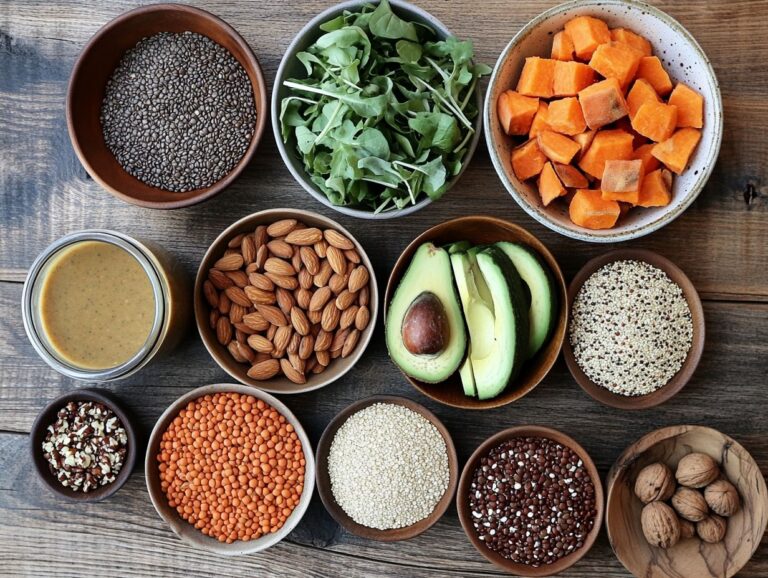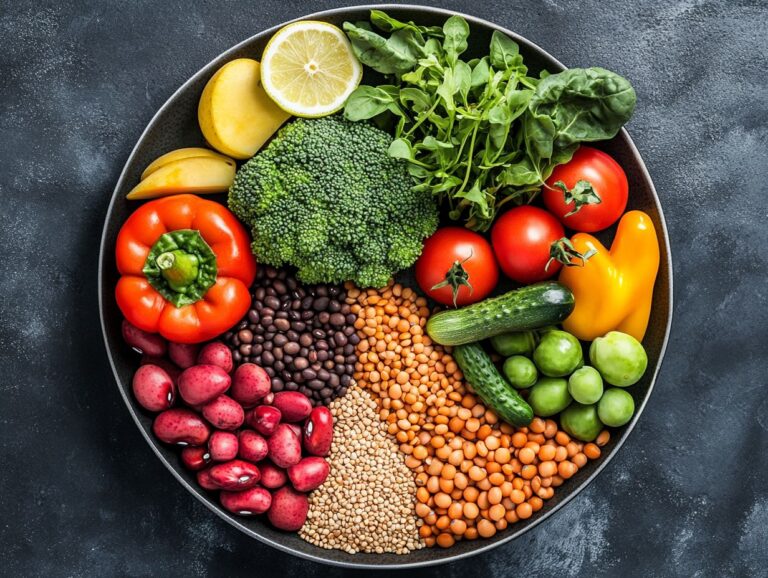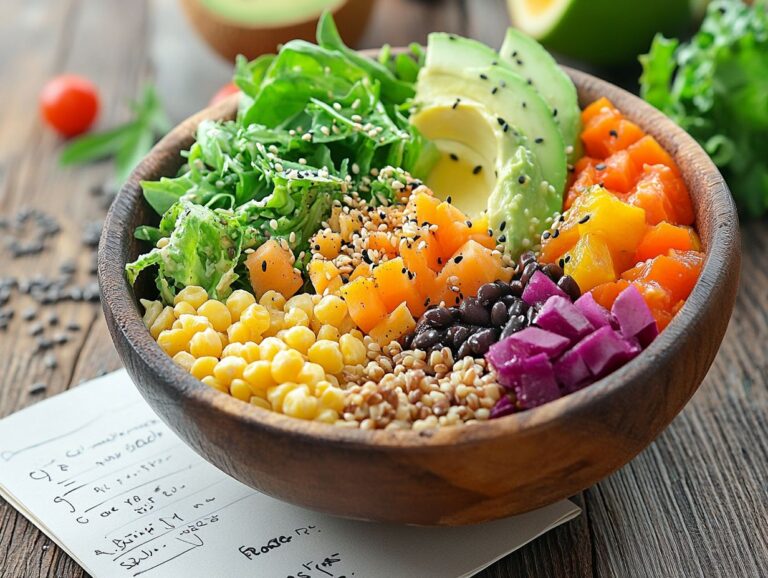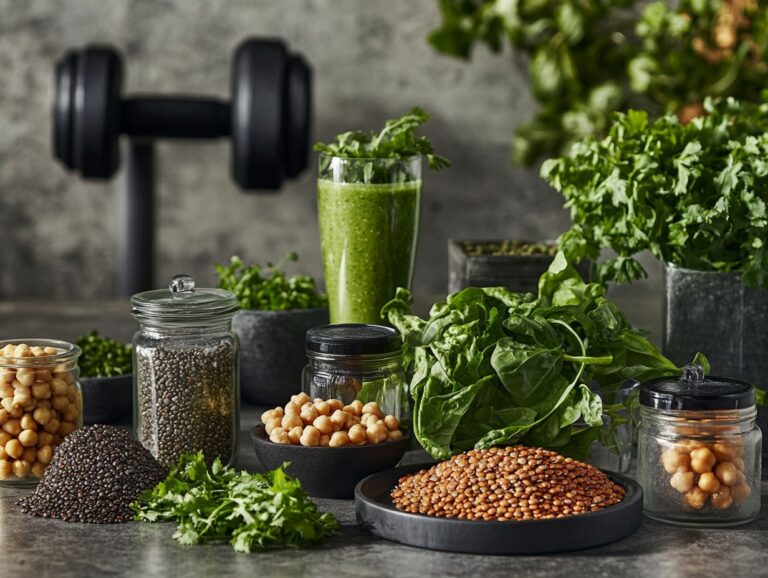An anti-inflammatory vegan gluten-free diet can enhance health and well-being by limiting gluten and animal products while prioritizing foods rich in antioxidants that reduce inflammation and boost vitality. The benefits of this diet include reduced inflammation, improved gut health, enhanced mood, and support for maintaining a healthy weight. We will offer guidelines on what to eat and avoid, meal planning suggestions, including meal prep and planning tips, and potential challenges to consider, equipping you with the essential tools for success in this plant-based lifestyle.
Key Takeaways:
- Incorporating an anti-inflammatory vegan gluten-free diet can reduce inflammation, improve gut health, support weight loss, and potentially enhance mood and mental health. It emphasizes the consumption of plant-based proteins and healthy fats.
- Avoid gluten-containing grains, animal products, and processed foods while including fruits, vegetables, whole grains, plant-based proteins, and healthy fats in your diet for optimal results. This aligns with dietary guidelines from health experts.
- To successfully follow this diet, plan your meals, read labels carefully, try new recipes, and listen to your body. Be aware of potential nutrient deficiencies, such as lack of dietary fiber or protein, and higher grocery costs, as well as social challenges that may arise. Consider seeking inspiration from resources like EatingWell and Christa Brown, M.S., RDN, LD.
What Is an Anti-Inflammatory Vegan Gluten-Free Diet?
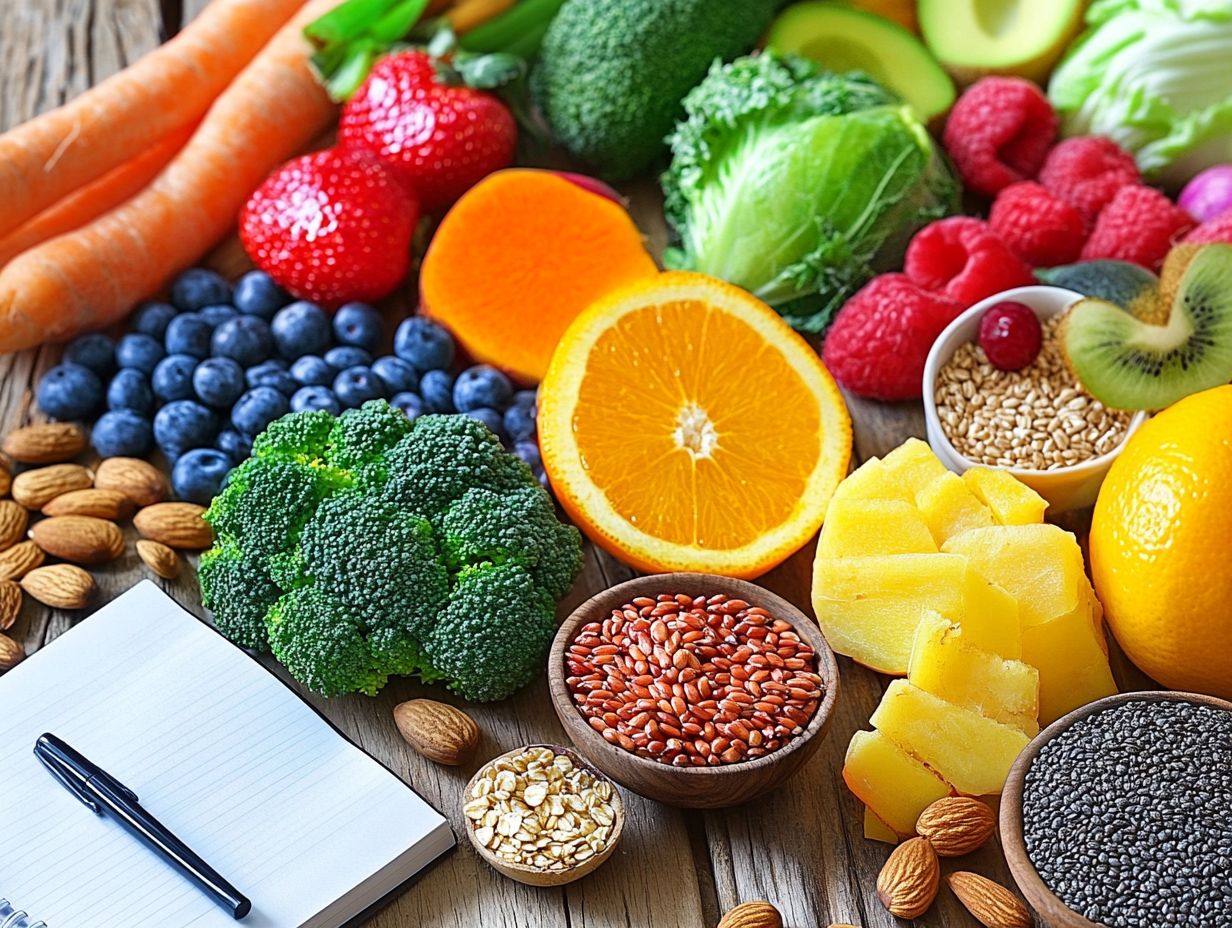 An anti-inflammatory vegan gluten-free diet is a dietary pattern aimed at reducing chronic inflammation and promoting overall health by emphasizing whole, plant-based foods that are free from gluten, including nutrient-dense fruits, vegetables, and healthy fats. Crafted by health experts, such as Sara Haas, RDN, LDN, and supported by nutrition education from professionals like Christa Brown, M.S., RDN, LD, this diet addresses the nutritional needs of individuals with specific health conditions, including autoimmune diseases, diabetes, heart disease, and obesity. By prioritizing nutrient-dense options and eliminating processed foods, this diet encourages the consumption of fruits, vegetables, whole grains, plant proteins, and healthy fats, all of which contribute to inflammation management and improved gut health and energy levels.
An anti-inflammatory vegan gluten-free diet is a dietary pattern aimed at reducing chronic inflammation and promoting overall health by emphasizing whole, plant-based foods that are free from gluten, including nutrient-dense fruits, vegetables, and healthy fats. Crafted by health experts, such as Sara Haas, RDN, LDN, and supported by nutrition education from professionals like Christa Brown, M.S., RDN, LD, this diet addresses the nutritional needs of individuals with specific health conditions, including autoimmune diseases, diabetes, heart disease, and obesity. By prioritizing nutrient-dense options and eliminating processed foods, this diet encourages the consumption of fruits, vegetables, whole grains, plant proteins, and healthy fats, all of which contribute to inflammation management and improved gut health and energy levels.
What Are the Benefits of Following an Anti-Inflammatory Vegan Gluten-Free Diet?
According to registered dietitian Sara Haas, an anti-inflammatory vegan gluten-free diet offers several advantages, particularly for those managing chronic inflammation, autoimmune diseases, diabetes, heart disease, and other health conditions associated with inflammation. These benefits include maintaining a healthy weight, increased energy levels, improved overall well-being, and enhanced immune system function, all stemming from a well-structured diet that meets essential dietary needs and nutritional requirements.
1. Reduces Inflammation
The primary benefit of an anti-inflammatory vegan gluten-free diet is its ability to reduce inflammation in the body, which is especially important for individuals suffering from chronic inflammation and associated health conditions like arthritis and heart disease. This diet leverages the natural antioxidants found in fruits, vegetables, and whole grains, which help block the inflammatory response and promote overall health. Vegan gluten-free foods such as berries, leafy greens, and nuts are rich in phytonutrients and vitamins that enhance immune function and lower the risk of developing inflammatory diseases like arthritis, heart disease, and cancer. Additionally, turmeric, a spice commonly used in plant-based meals, contains curcumin, known for its strong anti-inflammatory properties. Incorporating these nutrient-dense foods, along with mindful meal prep and cooking techniques, can lead to numerous health benefits, including reduced joint pain, improved digestive function, and increased energy levels, ultimately fostering a healthy lifestyle that taps into the body s natural healing abilities.
2. Promotes Gut Health
An anti-inflammatory, vegan, gluten-free diet promotes gut health by being high in dietary fiber, which is essential for a balanced gut microbiome and healthy digestion. Whole grains, legumes, fruits, and vegetables are rich sources of dietary fiber, crucial for maintaining proper gut function and supporting conditions associated with gut health. These plant-based foods not only provide essential nutrients but also serve as prebiotics, compounds that support the growth of beneficial bacteria in the gut. A healthy gut flora enhances nutrient absorption, reduces inflammation, and strengthens immunity. Additionally, the diverse phytonutrients found in various fruits and vegetables contribute to improved gut health, further supporting health improvement. By incorporating these foods into daily meals, individuals can also enhance long-term health outcomes, including lower rates of chronic diseases such as diabetes, heart disease, and obesity.
3. Supports Weight Loss
This diet promotes weight loss by encouraging the consumption of foods that are high in nutrients and low in calories, helping the body feel satiated while still providing essential nutrients, supporting a balanced diet. By following a well-balanced plant-based diet, individuals can maintain a healthy weight and boost their energy levels. This approach fosters portion control and mindful eating, allowing people to enjoy healthy foods without feeling deprived, while meeting their nutritional needs. Incorporating whole grains, fresh fruits, and vegetables into their daily diet reduces cravings for unhealthy, high-calorie snacks. The higher dietary fiber content of these foods contributes to a greater sense of fullness. Additionally, the psychological aspects of this lifestyle, such as increased awareness of food choices and the benefits of cooking, help cultivate a healthier relationship with food. This heightened consciousness about what they consume encourages individuals to naturally reduce unhealthy eating habits, ultimately supporting weight loss, health support, and overall well-being.
4. May Improve Mood and Mental Health
An anti-inflammatory, vegan, gluten-free diet may enhance mood and mental health, as foods with high nutritional quality provide essential vitamins and minerals necessary for optimal brain function, including Omega-3 fatty acids. Healthy fats and whole grains can further improve cognitive performance and emotional well-being. Research has consistently shown that diets rich in omega-3 fatty acids, found in flaxseeds and walnuts, significantly reduce feelings of anxiety and depression, supporting mental health improvement. Additionally, antioxidants obtained from fruits and vegetables help combat oxidative stress, which is known to adversely affect an individual’s emotional state. Complex carbohydrates in the diet also play a crucial role in regulating blood sugar levels, leading to improved energy levels and mood stability throughout the day. By deliberately choosing foods rich in these essential nutrients, individuals can foster a more balanced mindset and potentially alleviate symptoms of various mental health disorders, highlighting the strong connection between diet and mental health, and supporting vegan athletes in maintaining mental clarity.
What Foods Should You Avoid on an Anti-Inflammatory Vegan Gluten-Free Diet?
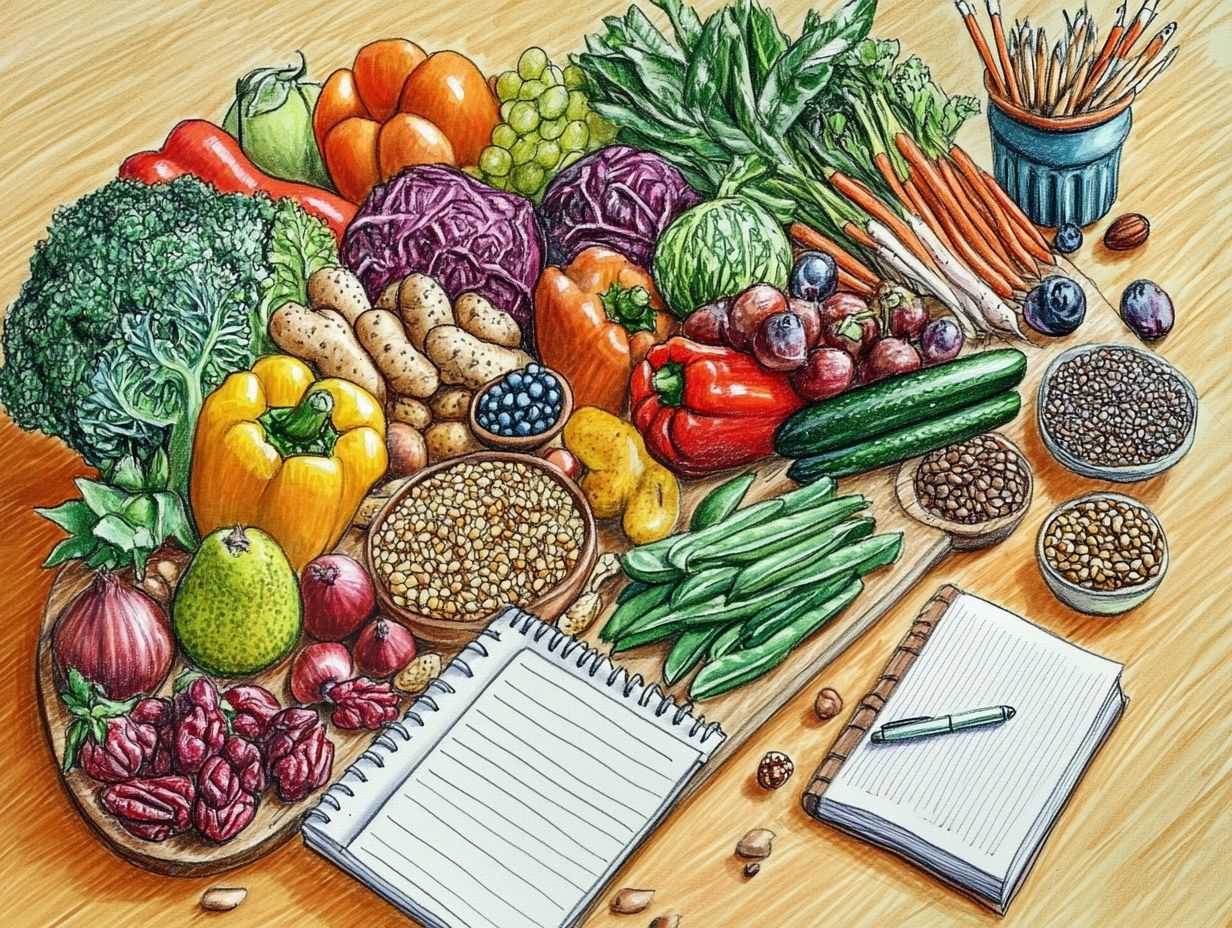 To effectively manage inflammation, it is important to avoid foods that trigger inflammatory responses and hinder progress toward health goals on an anti-inflammatory vegan gluten-free diet, ensuring diet consistency. This includes gluten-containing grains, animal products, and processed foods, which are often high in unhealthy fats, sugars, and additives that compromise dietary health benefits.
To effectively manage inflammation, it is important to avoid foods that trigger inflammatory responses and hinder progress toward health goals on an anti-inflammatory vegan gluten-free diet, ensuring diet consistency. This includes gluten-containing grains, animal products, and processed foods, which are often high in unhealthy fats, sugars, and additives that compromise dietary health benefits.
1. Gluten-containing Grains
Gluten-containing grains such as wheat, barley, and rye should be completely excluded from an anti-inflammatory vegan gluten-free diet, particularly for individuals with celiac disease, gluten intolerance, or other health conditions linked to gluten sensitivity. These grains can worsen inflammation and negatively impact health. According to the American College of Allergy, Asthma, and Immunology, this is primarily due to celiac disease being an autoimmune disorder, where the body mistakenly identifies gluten as a foreign threat. This response triggers an immune reaction that can lead to a cascade of inflammatory responses affecting multiple body systems, emphasizing the importance of a tailored dietary pattern. Many individuals who are undiagnosed with gluten sensitivity may experience symptoms of inflammation, such as bloating, diarrhea, fatigue, and joint pain, which can further deteriorate overall health without proper health support. The Mayo Clinic’s Guidelines for Healthy Eating suggest that adhering to dietary recommendations rich in whole gluten-free grains like quinoa and brown rice, along with plenty of fruits, vegetables, and legumes, can help reduce inflammation and promote a healthier lifestyle, also supported by the Mediterranean Diet principles.
2. Animal Products
In an anti-inflammatory vegan gluten-free diet, it is advisable to avoid animal products such as meat, dairy, and eggs, as they may provoke an inflammatory response and diminish the health benefits associated with a plant-based diet, integral to inflammation diet strategies. Animal products contain saturated fats and various pro-inflammatory proteins that can trigger inflammation, leading to a series of negative health effects, including chronic pain, digestive issues, and even cardiovascular diseases, compromising health conditions. In contrast, plant proteins found in legumes, nuts, and seeds provide essential amino acids along with a wide range of antioxidants and anti-inflammatory compounds, supporting inflammation management and overall dietary habits. Transitioning to this healthier diet can reduce inflammation, enhance nutrient intake, and support the immune system. Additionally, incorporating vegetables, whole grains, and using healthier cooking oils into the diet promotes overall gut health, contributing to increased vitality and overall well-being, and enhancing meal inspiration.
3. Processed Foods
Processed foods are high in sugars, unhealthy fats, and artificial additives, which can undermine an anti-inflammatory, vegan, gluten-free diet. These foods can induce inflammation and are associated with various related diseases, affecting diet consistency. Refined sugars and trans fats, commonly found in processed foods, interfere with the body’s natural inflammatory response, leading to elevated inflammatory markers. This not only increases the risk of chronic illnesses such as heart disease, diabetes, and certain cancers but also exacerbates the symptoms of autoimmune disorders, impacting dietary habits and health improvement. In contrast, healthier dietary patterns that emphasize whole, unprocessed foods rich in antioxidants, omega-3 fatty acids, and fiber are recommended for managing inflammation. By reducing the consumption of processed foods and adopting a plant-forward diet, individuals can significantly enhance their overall health and improve the body’s ability to recover from inflammation-related challenges, including chronic inflammation.
What Foods Should You Include on an Anti-Inflammatory Vegan Gluten-Free Diet for Optimal Health Benefits?
An anti-inflammatory, vegan, gluten-free diet should incorporate the right foods to maximize health benefits, manage inflammation, and enhance energy levels. Including a variety of fruits and vegetables, whole grains, plant-based proteins, and healthy fats ensures a broad spectrum of antioxidants, dietary fiber, and essential nutrients that contribute to overall health.
1. Fruits and Vegetables
Fruits and vegetables are essential components of an anti-inflammatory, vegan, gluten-free diet, as they are abundant in antioxidants, vitamins, and dietary fiber that help prevent inflammation and promote overall health. These foods possess anti-inflammatory properties and support the immune system, which is crucial for overall well-being. For instance, blueberries are high in anthocyanins, known for their ability to reduce inflammation, while dark green leafy vegetables like kale are rich in vitamins A, C, and K. Broccoli contains sulforaphane, which aids in reducing chronic inflammation, and oranges are an excellent source of vitamin C, contributing to the fight against chronic inflammation. Consuming a variety of fruits and vegetables helps create a nutritious diet rich in essential nutrients.
2. Whole Grains
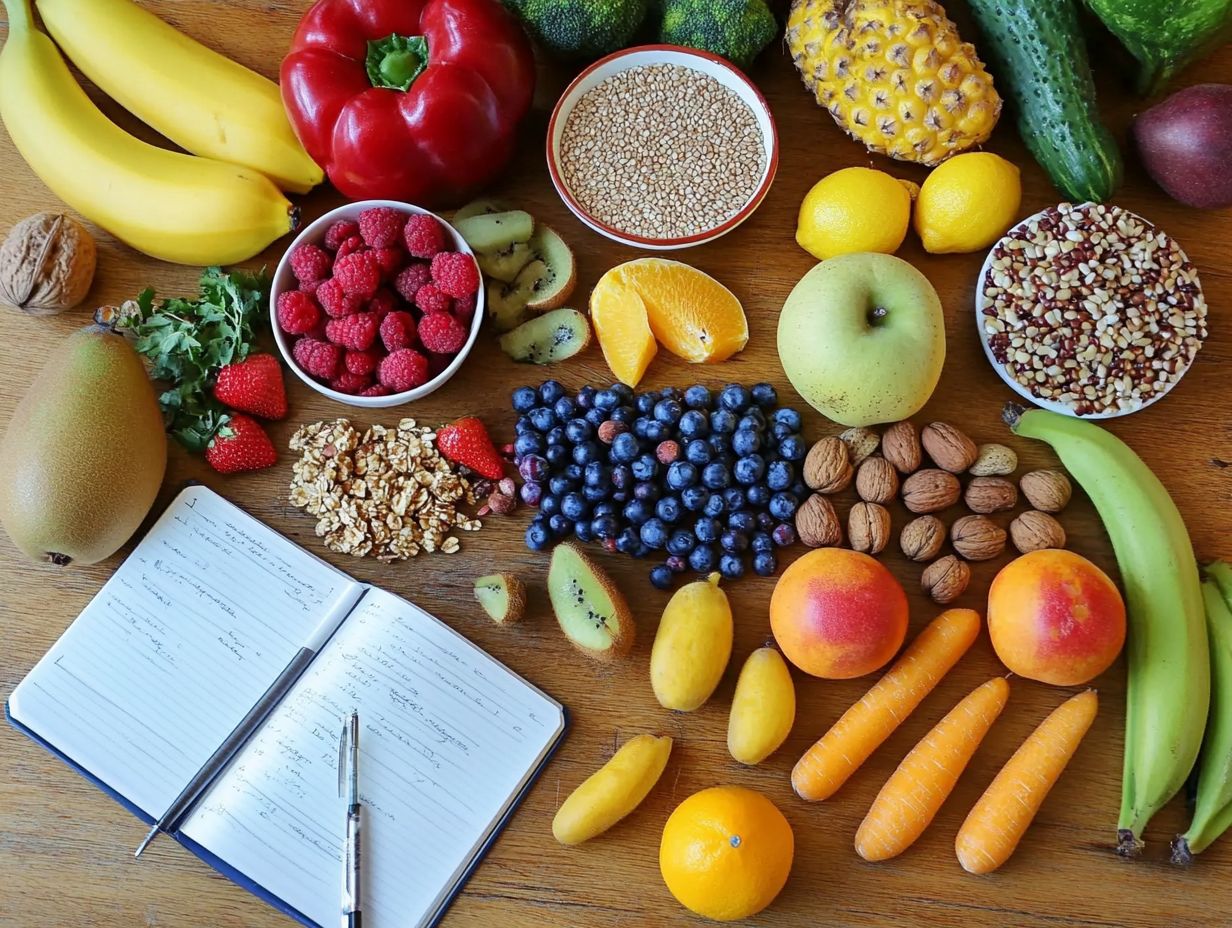 Whole grains are essential components of an anti-inflammatory vegan gluten-free diet, providing important nutrients and dietary fiber that promote gut health and aid in inflammation management. Quinoa, brown rice, and gluten-free oats are suitable grains within this dietary pattern. These grains are rich in dietary fiber, which plays a crucial role in maintaining gut health by regulating bowel movements and preventing constipation, as well as stabilizing blood sugar levels. Individuals following this dietary pattern also benefit from the antioxidants found in whole grains, which help reduce oxidative stress. As a result, they can achieve overall improved well-being while lowering the risk of chronic diseases and inflammatory conditions such as heart disease and type 2 diabetes.
Whole grains are essential components of an anti-inflammatory vegan gluten-free diet, providing important nutrients and dietary fiber that promote gut health and aid in inflammation management. Quinoa, brown rice, and gluten-free oats are suitable grains within this dietary pattern. These grains are rich in dietary fiber, which plays a crucial role in maintaining gut health by regulating bowel movements and preventing constipation, as well as stabilizing blood sugar levels. Individuals following this dietary pattern also benefit from the antioxidants found in whole grains, which help reduce oxidative stress. As a result, they can achieve overall improved well-being while lowering the risk of chronic diseases and inflammatory conditions such as heart disease and type 2 diabetes.
3. Plant-based Proteins and Vegan Proteins
Plant-based proteins, such as legumes, nuts, and seeds, are essential components of an anti-inflammatory vegan and gluten-free diet, as they provide the necessary protein without the inflammatory effects associated with animal products. These proteins are crucial for vegan athletes, helping maintain muscle health and supporting a balanced diet. These alternatives to animal protein are particularly beneficial for vegan athletes and individuals aiming to maintain muscle health. Not only do these protein sources aid in muscle repair and growth, but they also offer a wide array of vitamins, minerals, and antioxidants that support overall well-being. Incorporating foods like beans, lentils, chia seeds, and almonds into meals can enhance nutrient density while promoting heart health and stable energy levels. The diverse flavors and textures of these plant-based proteins enable individuals to create satisfying and nourishing meals that also reduce the risk of chronic diseases, making them a vital part of a balanced diet for anyone looking to improve their health.
4. Healthy Fats
Healthy fats, such as those found in avocados, nuts, and seeds, are key components of an anti-inflammatory vegan gluten-free diet because they provide essential fatty acids, including omega-3, which are known for their inflammation management properties. These healthy fats not only help manage inflammation but also promote heart and cognitive health. Incorporating sources of healthy fats like flaxseeds, chia seeds, and walnuts as toppings adds a satisfying crunch to salads or smoothies, enhancing both the flavor and nutritional content of meals. Cooking with oils like olive oil or avocado oil can also elevate the taste of various dishes while delivering their health benefits. When preparing meals, it is essential to pair these healthy fats with a diverse array of fruits and vegetables to ensure a wide intake of antioxidants that work together to reduce inflammation and improve overall health.
How to Successfully Follow an Anti-Inflammatory Vegan Gluten-Free Diet?
Successfully following an anti-inflammatory vegan gluten-free diet requires careful meal planning and preparation to ensure that nutritional needs are met while avoiding foods that trigger inflammation. Effective meal plans can guide individuals in maintaining a plant-based diet that caters to their health conditions and dietary guidelines. Implementing effective meal prep strategies, cooking techniques, and meal tracking can simplify this process.
1. Plan Your Meals and Snacks
Meal and snack planning is essential for maintaining an anti-inflammatory vegan gluten-free diet, as it ensures that individuals have the appropriate meals to adhere to their dietary routines and promote health improvements. To begin meal and snack planning, one can start by writing down their favorite recipes and using these, along with their dietary requirements, to create a shopping list. It is important to focus on incorporating a wide variety of colorful fruits and vegetables, as they are a key source of numerous antioxidants and vitamins. When balancing meals, it is advisable to include healthy fats, such as avocados or nuts, whole grains, and a source of protein, like legumes or tofu. Portion sizes should also be considered, ensuring that meals are satisfying without being overly filling. Snacks like hummus with carrot sticks or a small handful of nuts can help sustain energy levels throughout the day.
2. Read Labels Carefully
Carefully reading labels is essential when following an anti-inflammatory vegan gluten-free diet. This practice helps to avoid hidden ingredients that may trigger inflammation and ensures that products align with your dietary guidelines. It becomes even more important in a marketplace filled with processed foods that might contain gluten or animal-derived ingredients disguised under unfamiliar names. When evaluating vegan and gluten-free products, it is crucial to look for certifications such as “Certified Gluten-Free” or “Vegan,” which provide assurance regarding the integrity of the ingredients. Additionally, always check for added sugars, preservatives, and unhealthy fats commonly found in processed foods, as these can undermine the benefits of an anti-inflammatory approach. By developing the habit of scrutinizing labels, individuals can make informed choices that ensure their meals are both nourishing and consistent with their dietary preferences, particularly in managing inflammation response and chronic inflammation.
3. Experiment with New Recipes
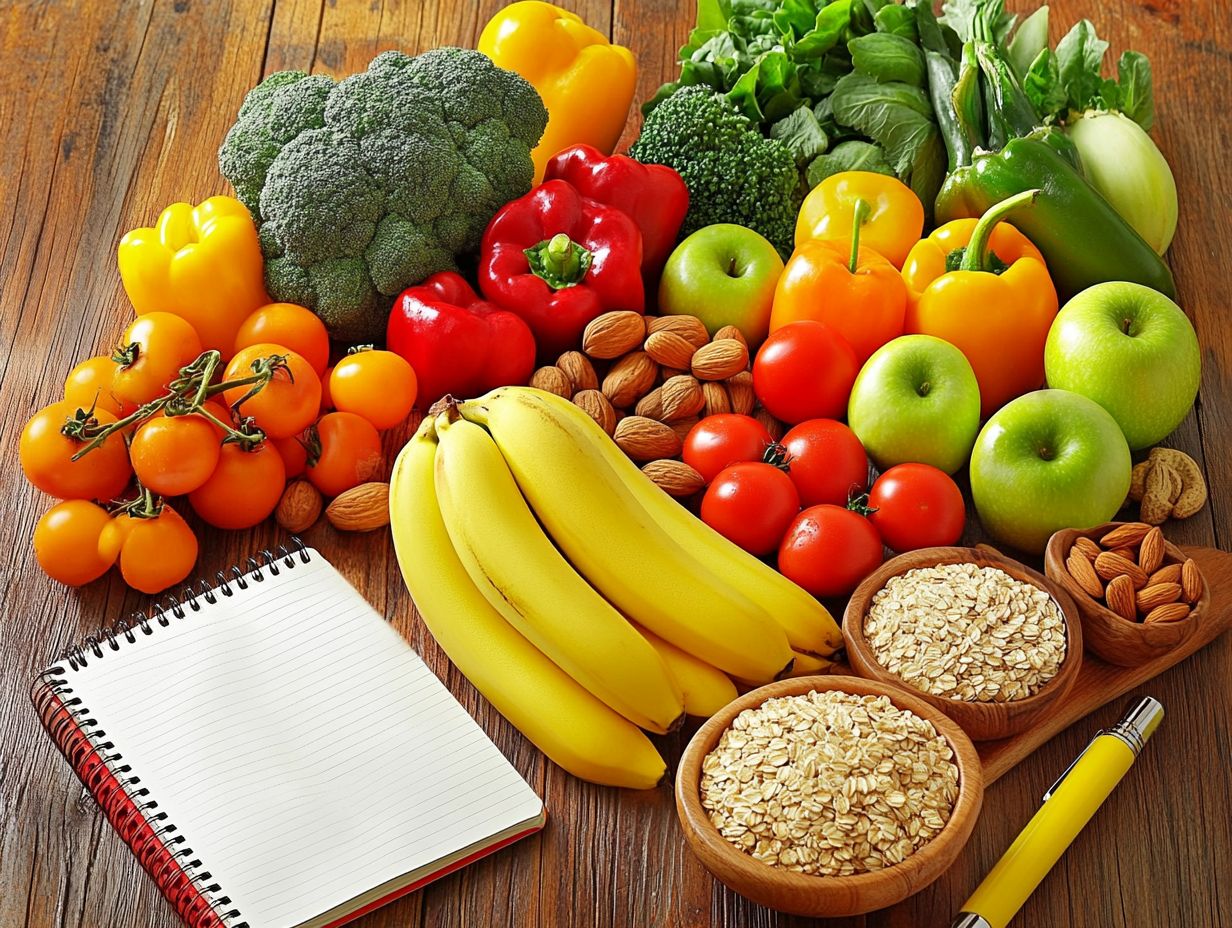 Experimenting with new recipes is a delightful way to add variety to an anti-inflammatory vegan gluten-free diet, offering meal inspiration and opportunities for cooking demonstrations, recipe development, and food photography. By trying out different ingredients and cooking methods, you can explore a wide range of flavors and textures, from salads and grain bowls to soups and baked goods. Utilizing seasonal produce is an excellent way to enhance flavor and ensure that nutrients, including essential nutrients like omega-3 and dietary fiber, are at their peak. For those seeking assistance, there are numerous cookbooks and online resources available that provide creative ideas for an anti-inflammatory vegan gluten-free diet. Additionally, online cooking communities can serve as valuable sources of support, offering tips and tricks to make the cooking process even more enjoyable. Don t hesitate to try new things and have fun in the kitchen!
Experimenting with new recipes is a delightful way to add variety to an anti-inflammatory vegan gluten-free diet, offering meal inspiration and opportunities for cooking demonstrations, recipe development, and food photography. By trying out different ingredients and cooking methods, you can explore a wide range of flavors and textures, from salads and grain bowls to soups and baked goods. Utilizing seasonal produce is an excellent way to enhance flavor and ensure that nutrients, including essential nutrients like omega-3 and dietary fiber, are at their peak. For those seeking assistance, there are numerous cookbooks and online resources available that provide creative ideas for an anti-inflammatory vegan gluten-free diet. Additionally, online cooking communities can serve as valuable sources of support, offering tips and tricks to make the cooking process even more enjoyable. Don t hesitate to try new things and have fun in the kitchen!
4. Listen to Your Body
Listening to your body is a crucial aspect of successfully adopting an anti-inflammatory vegan gluten-free diet. It allows you to understand how different foods influence your eating patterns, dietary habits, and overall health. By paying attention to your body’s signals, you can learn to distinguish between foods that make you feel good and those that may trigger undesirable symptoms or reactions. Meal tracking can be an effective tool in this process, enabling individuals to not only record what they eat but also note their physical and emotional responses after consuming specific foods. This practice increases awareness of how certain foods, such as gluten or animal products, may impact health and aids in making informed choices to maintain a plant-based diet. This reflective process is highly individualized, helping to ensure that the benefits of a non-inflammatory diet, including improved immune system function and health improvement, are fully realized.
Are There Any Risks to Following an Anti-Inflammatory Vegan Gluten-Free Diet?
An anti-inflammatory, vegan, gluten-free diet carries certain risks, including potential nutrient deficiencies, higher grocery costs, and social challenges related to specific dietary practices. Adhering to such a dietary pattern requires careful consideration of nutrient-dense food sources to prevent deficiencies.
1. Nutrient Deficiencies
An anti-inflammatory vegan gluten-free diet can lead to nutrient deficiencies if essential nutrients from a variety of food sources are not carefully incorporated into meals. Individuals following this type of diet often find themselves lacking in vitamin B12, iron, and omega-3 fatty acids. Since vitamin B12 is predominantly found in animal products, it can be challenging to obtain without supplements or fortified foods; therefore, it is crucial to include options like nutritional yeast or fortified plant milks in the diet. Consulting with a registered dietitian, such as Sara Haas, RDN, LDN, can help in planning a balanced vegan meal that meets all nutritional needs. While iron is present in beans and leafy greens, its absorption can be poor, necessitating consumption alongside vitamin C-rich foods such as bell peppers or citrus fruits to enhance absorption. Omega-3 fatty acids, essential for brain health, are typically found in fish, but can also be sourced from flaxseeds, chia seeds, and walnuts.
2. Higher Grocery Costs
An anti-inflammatory vegan gluten-free diet, which often includes whole grains, vegan proteins, and nutrient-rich foods, tends to be more expensive because it primarily consists of fresh, whole foods and specialty items not readily available in standard grocery store aisles. However, there are several strategies to reduce grocery costs while maintaining this dietary lifestyle.
- First, meal planning and meal prep are some of the most effective ways to control expenses. By deciding in advance which meals to prepare for the week, including incorporating vegan meals, you can create a corresponding shopping list that maximizes your purchases and ensures each meal is nutritionally balanced.
- Second, buying in bulk can lead to significant savings. Purchasing staples such as grains, beans, nuts, and legumes in larger quantities allows you to store them for extended periods, ultimately reducing overall costs while supporting a balanced diet and improving gut health.
- Third, selecting seasonal produce is another cost-effective strategy. Fresh fruits and vegetables that are in season are often more plentiful, which can lower prices compared to out-of-season options that may be imported.
By combining these three methods meal planning, bulk buying, and choosing seasonal produce you can achieve cost savings while adhering to an anti-inflammatory diet, which supports inflammation management, improves energy levels, and meets nutritional needs.
3. Social Challenges
Following an anti-inflammatory vegan gluten-free diet, which emphasizes plant-based eating and minimizing processed foods, can present social challenges, particularly when attending gatherings or dining out, where food options may be limited and dietary practices may differ from those of friends and family. However, these challenges can be alleviated through effective communication and planning to ensure that one’s dietary needs, such as those for managing chronic inflammation or following an inflammation diet, are understood without causing embarrassment or drawing undue attention. It is beneficial to discuss dietary requirements with hosts ahead of time, as they are often willing to accommodate specific requests if informed in advance. For instance, suggesting popular alternatives like gluten-free grain bowls, plant proteins, or vegan appetizers can enhance the dining experience for everyone involved. Being open about one s dietary choices, which may include avoiding gluten to manage a health condition or improve dietary fiber intake, may encourage others to be more respectful and accommodating of diverse eating practices, fostering an environment that is supportive of healthy eating habits and health improvement.
